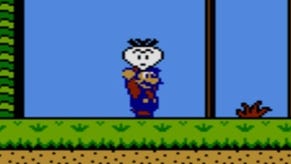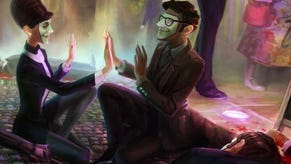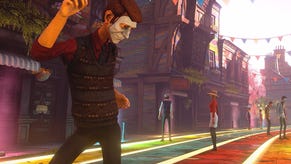We Happy Few developer responds to ban by Australian Classification Board
UPDATE: Board explains its decision in detail.
UPDATE 24/5/18: The Australian Classification Board has released a new statement, more fully explaining its reasoning for refusing to classify Compulsion Games' upcoming dystopian survival adventure We Happy Few, effectively banning it from sale in the country.
As expected, it's the game's depiction of drugs that has fallen foul of the board's strict rules. The board believes that We Happy Few's "drug-use mechanic making game progression less difficult constitutes an incentive or reward for drug-use and therefore, the game exceeds the R 18+ classification that states, 'drug use related to incentives and rewards is not permitted'".
To support its point, the board highlights the fact that "If a player has not taken Joy, NPCs become hostile towards the player if they perform behaviours including running, jumping and staring. An NPC character called the Doctor can detect when the player has not taken Joy and will subsequently raise an alarm. A player that takes Joy can reduce gameplay difficulty, therefore receiving an incentive by progressing through the game quickly."
"Although there are alternative methods to complete the game," it notes, "gameplay requires the player to take Joy to progress."
That, of course, is an extraordinary literal interpretation of the game's events, failing to contextualise We Happy Few's drug use in relation to its underlying themes of dystopian suppression and control. Hopefully Compulsion will be able to make progress with the board when, as previously announced, it seeks to "provide additional information, to discuss the issues in depth, and see whether they will change their minds".
The Australian Classification Board's full, slightly spoiler-y statement (as supplied to PC Gamer overnight) can be found below.
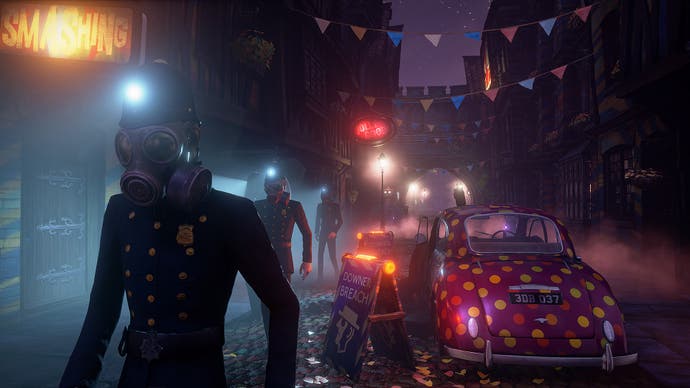
"Gameplay consists of exploring the fictional English town of Wellington Wells in first-person as three separate playable characters, where non-playing characters consume the government-mandated, fictional drug "Joy" in the form of pills, which include side-effects such as euphoria and memory loss. When the player consumes Joy, surreal, psychedelic sequences including butterflies and brightly-coloured street-scapes appear. In keeping with the fantasy setting, character models and environments are brightly-coloured and stylised.
"Players have the option to conform with NPCs and take Joy pills when exploring the Village or Parade District areas of the game. If a player has not taken Joy, NPCs become hostile towards the player if they perform behaviours including running, jumping and staring. An NPC character called the Doctor can detect when the player has not taken Joy and will subsequently raise an alarm. A player that takes Joy can reduce gameplay difficulty, therefore receiving an incentive by progressing through the game quickly. Although there are alternative methods to complete the game, gameplay requires the player to take Joy to progress.
"In one sequence, an NPC is viewed on the ground, convulsing owing to a reaction from taking a Joy pill, which has subsequently turned bad. After several NPCs encourage her to take Joy and she refuses, fearing that it will have an adverse effect, they beat her with steel pots and a shovel, until she is implicitly killed. In another sequence, the player is seen in first-person view, entering a telephone box that contains three large pill dispensers, each holding a different flavoured Joy pill. The player consumes a Joy pill and a swarm of brightly-coloured butterflies appear as well as rainbows and coloured pathways on the ground, improving speed and visibility for the player.
"In the Board's opinion, the game's drug-use mechanic making game progression less difficult constitutes an incentive or reward for drug-use and therefore, the game exceeds the R 18+ classification that states, "drug use related to incentives and rewards is not permitted".
"Therefore, the game warrants being Refused Classification."
ORIGINAL STORY 23/5/18: Psychedelic survival adventure We Happy Few has been rejected for certification by the Australian Classification Board, preventing its release and effectively banning it from sale in the country. Developer Compulsion Games has now addressed the board's decision in a new blog post.
We Happy Few's events unfurl in the shadow of a dystopian society, which, as in the seminal 60s TV series The Prisoner, hides behind the quaint facade of a picturesque English village. Wellington Wells' always-smiling citizens, eager to forget a horrifying shared experience, spend their days high on a hallucinogenic drug called Joy - leading into We Happy Few's core themes of addiction, mental health, and drug abuse.
According to the Australian Classification Board's website, games that are Refused Classification commonly "depict, express or otherwise deal with matters of sex, drug misuse or addiction, crime, cruelty, violence or revolting or abhorrent phenomena in such a way that they offend against the standards of morality, decency and propriety generally accepted by reasonable adults to the extent that they should not be classified."
It's not explicitly stated which specific elements of We Happy Few the notoriously ban-happy classification board took umbrage with, but it's easy to conclude that it's related to drug use. Famously, Fallout 3's Med-X item was originally known as morphine - until the Australian Classification Board refused to grant a certificate unless Bethesda removed all real-world drug references. Obviously though, "Joy" is not a real drug, so it's unclear what's happening here.
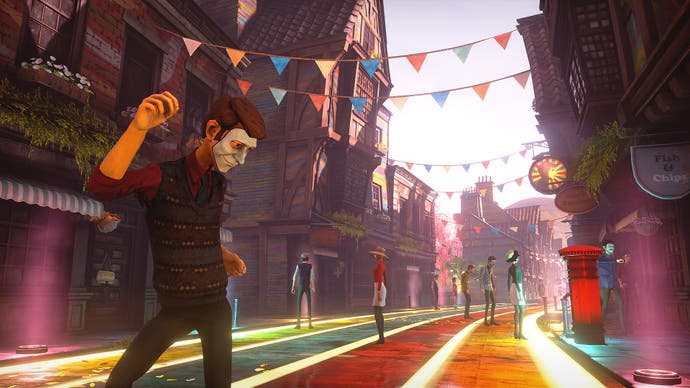
Addressing the board's decision, developer Compulsion said it had received "hundreds of messages from fans appreciating the treatment we've given [We Happy Few's themes], and we believe that when players do get into the world they'll feel the same way."
The studio also, pointedly, drew attention to the fact that We Happy Few's first scene "consists of the player character redacting material that could cause offense to 'society at large', as part of his job as a government 'archivist'. It's a society that is forcing its citizens to take Joy, and the whole point of the game is to reject this programming and fight back."
"In this context," it said, "our game's overarching social commentary is no different than Aldous Huxley's Brave New World, or Terry Gilliam's Brazil."
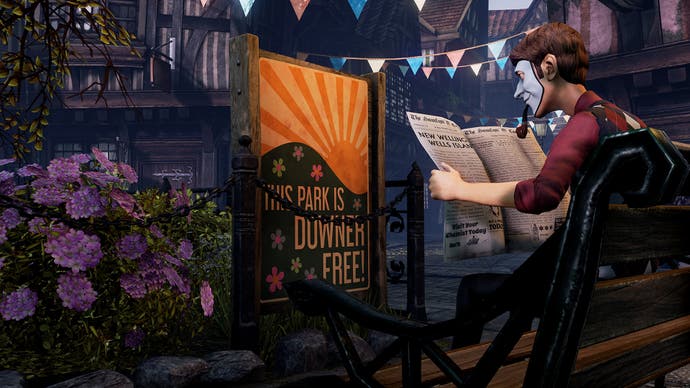
Compulsion notes that it "will be talking to the ACB to provide additional information, to discuss the issues in depth, and see whether they will change their minds". If its attempts are unsuccessful, however, the developer says it will make sure that Australian fans "can get a refund, and we will work directly with affected Kickstarter backers to figure something out. We would appreciate if you give us a little bit of time to appeal the decision before making a call."
This isn't the first controversy to befall We Happy Few, of course. Eyebrows were raised when, following the news that Gearbox would publish the title, its early access price leaped from £23 to almost £40. Compulsion later suspended its early access programme in response to criticism.
We Happy Few was originally scheduled to launch on PC, PS4, and Xbox One in April, but was delayed to "summer" in order to improve the game's structure and flow.





